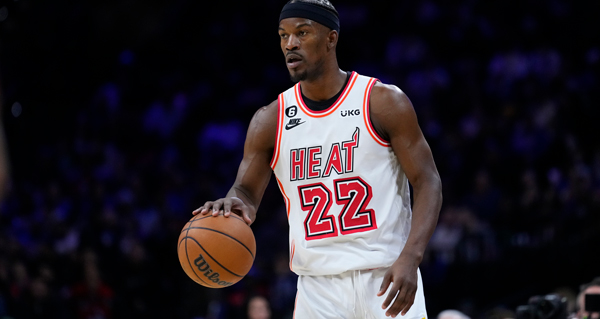There are conspiracy theories out there, about Michael Jordan being Jimmy Butler's dad. Like many other fringe kook narratives, it’s explained with no shortage of campy sarcasm, and relies more on vibes than science. But while most goofball postulates die during the explanation stage, this one has a slightly longer credulity window. Because when Butler gets going on the court—as he did Monday night, with a historic 56-point playoff display—the list of guys we’re reminded of is a short one, centrally featuring his pretend mythical dad.
As with Jordan, artistry is important to Butler’s game. While he isn’t one of the more pronounced on-court stylists of his generation—far from it—there is definitely something consistently more qualitative than technical about how he goes about getting his many, many buckets. He is fast, but not close to being one of the game’s fastest. He is big enough, and certainly very strong, but there are much bigger and stronger players; including Giannis Antetokounmpo, who he scored on five times Monday night, through six attempts. He can generally shoot pretty well, but he’s never been described as a proper marksman. And while Butler is quite athletic overall he is, again, not one of the more athletic players around.
Putting all his traits together doesn’t explain his greatness; with Butler, we are definitely not dealing in simple arithmetic. There is a more holistic power that he has access to, involving his fearlessness and his great strategic intelligence but not limited to these things. A better assessment probably exists elsewhere, but here I will suggest that his true peer is Nikola Jokic. Both are players who, in terms of traditional combine-style rubrics, blow expectations out of the water. Both have certainly destroyed their draft-night stock, with Jokic going 41st overall in 2014, and Butler going 30th overall in 2011. Most importantly, both thrive as they do because of an otherworldly understanding of what their bodies—and the bodies of their foes—can and cannot do. When they carve top-end defenses, it appears less that they are doing so because of physical superiority, and more due to them having played this specific live game already, and studying the tape of it extensively, like you might see a science-fiction protagonist do when he finally figures out how to re-shape his funky world.
This elite, instinct-rich proprioception is something a Yoga or Jeet Kune Do scholar is more qualified to fully explain, or maybe a sports psychologist, but on the court we know what it looks like, especially in the midst of opponents who lack it: magic. Butler suddenly fills cracks in the defense that didn’t appear to exist. He knows his defenders are falling or slipping before they do. It can look as if his onslaught of scoring is happening within an obstacle course populated by robots. Confronted with long broad walls, he somehow turns corners. When he gets effortlessly into the lane against well-set defenses, it makes you feel dizzy and dislocated, like looking too long at an M.C. Escher painting does.
Butler’s been at it for a while, but his excellence has reached another level with the Miami Heat, a team seemingly built to employ him. Long the source of mythologies concerning hyper-professionalism—including the rumor that the team covers up its practice facility’s view of the Atlantic Ocean, to keep players from feeling too relaxed—Butler one-upped team president Pat Riley’s vein-popping, no-nonsense culture in this first season with the team by leaving his family at home during the team’s Orlando "bubble" campus postseason run, during the peak of the pandemic in 2020. “This is a business trip,” he said.
Such intensity isn’t for everyone. Before finding marital bliss with Riley, Butler stormed through terms with the Chicago Bulls, Minnesota Timberwolves, and Philadelphia 76ers, rankling teammates, coaches, and executives at each stop. In Miami, though, friction is invited. Just over a year ago, Butler and long-tenured head coach Erik Spoelstra had to be separated on the sidelines during a game as they screamed at each other; the typically cool-headed Spoelstra even huffily threw his clipboard to the ground. Stories about the team’s implosion swirled, but the next month they began a Butler-fueled playoff run that ended just one shot short of the NBA Finals.
Almost exclusively as a result of Butler’s bravura, the eighth-seeded Heat now lead the Milwaukee Bucks, the regular season’s best team, three games to one in their first round series. Finishing the job should prove a difficult task, made harder if Butler’s play drops even a little from the Herculean standard he’s set by averaging 37 points in the series, on 63 percent shooting. No matter what happens next, the show he’s already put on will be spoken of for a long, long time. But if he can keep it up, it will be discussed for even longer.



